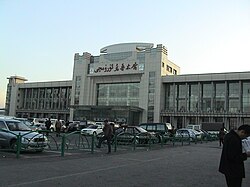April 2014 Ürümqi attack
Terrorist attack by Uighur separatists in Ürümqi, Xinjiang, China From Wikipedia, the free encyclopedia
On 30 April 2014, a bomb-and-knife attack occurred in the Chinese city of Ürümqi, Xinjiang. The terrorist attack killed 3 people, and injured 79 others. The attack coincided with the conclusion of a visit by Xi Jinping, General Secretary of the Chinese Communist Party to the region.[1]
| April 2014 Ürümqi attack | |
|---|---|
 A view of Ürümqi South Railway Station | |
| Location | Ürümqi, Xinjiang, China |
| Date | 30 April 2014 7:10 pm (China Standard Time) |
| Target | Ürümqi Railway Station |
Attack type | Suicide bombing; knife attack |
| Deaths | 1 |
| Injured | 79 |
| Perpetrators | Turkestan Islamic Party |
| Motive | Islamic extremism |
At approximately 7:10 pm local time, a pair of assailants attacked passengers with knives and detonated explosives at the city's railway station.[2][3] Police closed off all entrances to the station in the immediate aftermath of the attack, but it was reopened at 9 pm with increased security. The number of perpetrators involved in the attack is unknown,[4] but 2 individuals are suspected.[5] The Turkestan Islamic Party claimed responsibility.[6]
Background
The attack occurred on the final day of Xi Jinping's 4-day tour of the region.[4] A day prior, he labelled Xinjiang the "front line against terrorism" during a visit to the nearby city of Kashgar, and vowed to take a hardline against terrorism and violence attributed to Muslim Uyghur separatists, which killed at least 100 people over the past year.[7] It is not known if Xi was still in the province when the attack took place.[4] On the morning of the attack, he visited a mosque – located 2 kilometres (1.2 mi) away from the railway station – and urged religious leaders to foster harmony among the people in Xinjiang by giving followers a better understanding of religious teachings.[2]
Attack
Summarize
Perspective


At 7:10 pm local time on 30 April 2014,[1] a group of individuals used knives to attack passengers and detonated bombs at the exit of Ürümqi South Station.[2] Originally, it was thought that the explosives came from luggage situated between the station and the bus stop outside,[8] but the People's Daily stated that the attackers had "set off bombs tied on their bodies and died."[9] The scope of the blast was also disputed. While one worker at a nearby hostel had reportedly mistaken the explosion for an earthquake,[10][11] another eyewitness noted how the bomb appeared to be "home made, as the blast was not massive."[2] Initially, the attack was said to have injured fifty people, but state news media revised the figures the next morning to three killed and seventy-nine injured.[4]
It was reported that the attack was carried out by two religiously motivated suicide bombers.[12] One of them was identified as Sedierding Shawuti, a 39-year-old Uyghur from Xayar County, Aksu in Southern Xinjiang.[9][13] According to an anti-terrorist intelligence service, a group named Turkestan Islamic Party has claimed responsibility for the attack.[6]
Initial response
After the attack, "security forces moved quickly" to the station, and later paramilitary and riot[5] police were stationed on its various entrances.[1][2][14] Casualties were taken to the hospital in ambulances, but taxis were also commandeered to compensate for a lack of ambulance availability and to ensure the swift treatment of injuries.[5] According to Xinhua News Agency, the area around the station was evacuated by security forces.[15] The bombing meant that the rail services ceased for about two hours, and ensuing this attack nearby shops repaired minor damage and tightened security.[5]
There was an overnight cordon around the train station,[5] which was lifted at 9:00 pm,[16] amid heavier police security.[4]
Many internet posts regarding the attack were rapidly censored by the Chinese government. Sina Weibo, the country's largest microblogging site, took down comments and photos pertaining to the explosion,[1] which had come through within an hour on their "Breaking News" account. It did not make any further updates for two hours.[17]
Reactions
Communist Party general secretary Xi Jinping responded to the incident by promising "decisive actions [against] terrorist attacks"[14] and stated that a "strike-first" strategy would be implemented.[10] He also called on government officials in the region to do everything they could to ensure that the injured were assisted, the crime investigated and the perpetrators punished severely.[2]
Search engine Baidu prevented certain results from appearing when searching for terms related to the attack – citing "relevant legal rules and policies"[18] – while Chinese news media simply duplicated the report by Xinhua News Agency, which is required of them when reporting on sensitive topics.[18]
References
Wikiwand - on
Seamless Wikipedia browsing. On steroids.
